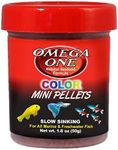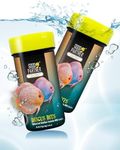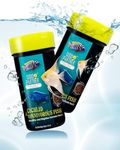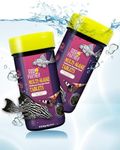Buying Guide for the Best Betta Foods
Choosing the right food for your Betta fish is crucial for their health, color vibrancy, and overall well-being. Betta fish have specific dietary needs that must be met to ensure they thrive. When selecting Betta food, it's important to consider the nutritional content, type of food, and feeding habits. Understanding these key specifications will help you make an informed decision and keep your Betta happy and healthy.Nutritional ContentNutritional content refers to the vitamins, minerals, and other nutrients present in the food. This is important because Betta fish require a diet high in protein to support their growth and maintain their vibrant colors. Look for foods that list protein as the primary ingredient, ideally with a protein content of 30-40%. Avoid foods with fillers like wheat or corn, as these do not provide the necessary nutrients. Choose a food that offers a balanced diet with essential vitamins and minerals to keep your Betta healthy.
Type of FoodThe type of food refers to the form in which the food is available, such as pellets, flakes, freeze-dried, or live food. This is important because different types of food can affect how well your Betta eats and digests it. Pellets are a popular choice because they are easy to portion and reduce waste. Flakes can be less ideal as they may lose nutrients quickly and can be messy. Freeze-dried foods are a good option for variety but should be soaked before feeding to prevent digestive issues. Live foods, like brine shrimp or bloodworms, are excellent for occasional treats but should not be the main diet due to the risk of introducing parasites. Choose a type of food that fits your Betta's preferences and your feeding routine.
Feeding FrequencyFeeding frequency refers to how often you should feed your Betta fish. This is important because overfeeding can lead to obesity and water quality issues, while underfeeding can cause malnutrition. Bettas typically do well with small feedings 1-2 times a day. Each feeding should consist of an amount they can consume within 2-3 minutes. Adjust the frequency based on your Betta's activity level and appetite. Consistent feeding schedules help maintain their health and prevent digestive problems.
Food SizeFood size refers to the physical size of the food particles. This is important because Betta fish have small mouths and can struggle with food that is too large. Pellets and other food types should be small enough for your Betta to eat comfortably. If the food is too large, it can cause choking or digestive issues. Choose a food size that matches the size of your Betta's mouth to ensure they can eat it easily and safely.
IngredientsIngredients refer to the specific components that make up the food. This is important because high-quality ingredients ensure your Betta gets the necessary nutrients without harmful additives. Look for foods with whole fish or shrimp as the first ingredient, as these provide the best protein sources. Avoid foods with artificial colors, preservatives, or fillers, as these can be harmful to your Betta's health. Choose foods with natural, high-quality ingredients to support your Betta's overall well-being.




















